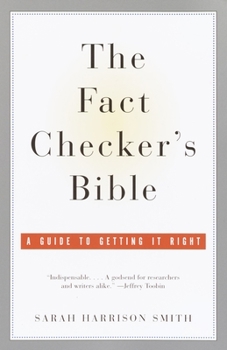The Fact Checker's Bible: A Guide to Getting It Right
Select Format
Select Condition 
Book Overview
These days fact-checking can seem like a lost art. The Fact Checker's Bible arrives not a moment too soon- it is the first-and essential-guide to the important but increasingly neglected task of checking facts, whatever their source. We are all overwhelmed with information that claims to be factual, but even the most punctilious researcher, writer, and journalist can sometimes get it wrong, so checking facts has become a more pressing task. Now Sarah Harrison Smith, former New Yorker fact checker and currently head of checking for The New York Times Magazine explains exactly how to- *Reading for accuracy *Determine what to check *Research the facts *Assess sources- people, newspapers and magazines, books, the Internet, etc. *Check quotations *Understand the legal liabilities *Look out for and avoid the dangers of plagiarism For everyone from students to journalists to editors, the methods and practices outlined in The Fact Checker's Bible provide both a standard and a working manual for how to get the facts right.
Format:Paperback
Language:English
ISBN:0385721064
ISBN13:9780385721066
Release Date:August 2004
Publisher:Knopf Doubleday Publishing Group
Length:192 Pages
Weight:0.47 lbs.
Dimensions:0.5" x 5.2" x 8.0"
Customer Reviews
1 rating
Sharpen your reading and writing skills
Published by Thriftbooks.com User , 20 years ago
Fittingly, the descriptions of THE FACT CHECKER'S BIBLE given in the blurbs above exactly match Sarah Harrison Smith's book. Despite an enviable résumé, something in Smith's tone suggests youthful excitement---inasmuch as she still finds it exciting to track down the ten thousand details that a writer has already dug up in order to ensure that she or he has got them all right. (In literary studies, those people are called critics and biographers.) But considering the number of scandals concerning plagiarism, fabrication, and sheer audacity in American journalism during recent years, this demanding task is a necessary one---even though it is surrounded by so many legal pitfalls that it sounds like Hell, Inc. (Her chapter on fact-checking poetry and fiction comes off as a little comic, albeit unintentionally, and suggests it is likely that she writes neither: when creating imaginative literature, accuracy is swell but plausibility is paramount.) Far from being addressed only to colleagues in the profession, this brisk handbook will educate anyone who writes anything, and readers who wish to become better judges of everything they read---in the news, in their own area of expertise, or for pleasure. Smith maintains the fine line where skepticism does not sour into cynicism, and makes better critics of us all.





